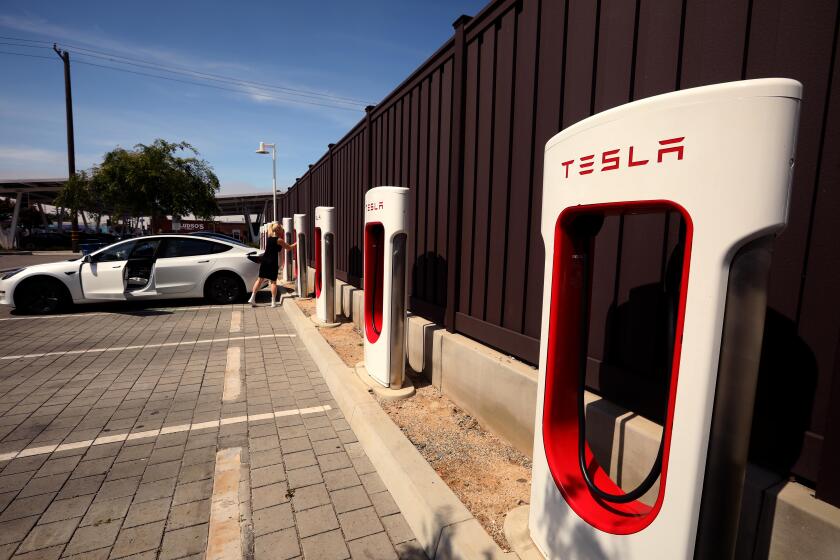More Deaths Are Linked to Faulty Tires
The controversy over Firestone tires used on Ford Motor Co. trucks intensified Thursday, as U.S. authorities linked many more deaths to the suspect tires and a Venezuelan safety agency recommended criminal charges be pursued against both companies.
With Ford’s reputation on the line from the massive Firestone tire recall, Chief Executive Jac Nasser hammered the tire company, charging that it has been unwilling to confront problems with its products. He also called for a review of how tire manufacturers share product data with auto makers.
“I’m sorry that these defective tires are on our vehicles, and I’m depressed with the resultant anxiety, injury and deaths,” Nasser said at his first news conference since the Aug. 9 recall of the tires, most of which were sold on Ford Explorer sport-utility vehicles.
Nasser stopped short of saying he would cut ties with Bridgestone/Firestone Inc., which has been a key Ford supplier for 94 years. But it was clear where he places the blame for the accidents, caused when tire treads separated at high speeds, predominantly on Ford’s best-selling Explorer.
Meanwhile, the National Highway Traffic Safety Administration said it had received reports of 26 additional deaths related to Firestone tire failures, raising its overall total to 88.
A Los Angeles Times computer analysis of NHTSA files, however, found 69 deaths after removing cases in which the tire model was unknown or not listed. Using The Times’ criteria, that represents an increase of 15 deaths over the previously reported number.
Sean Kane, a Virginia-based litigation consultant who helped bring the tire problems to light earlier this summer, expects the numbers to go even higher.
“It wouldn’t surprise us to see the fatalities exceed 100 over the next several weeks,” Kane said, because more previously unreported cases will now likely be referred to the government. “This is the biggest defect issue we have seen in years.”
The Times analysis of NHTSA data confirmed earlier patterns showing most of the reported tire failures occurring in warm-weather states. California filed the most complaints with the agency, 224, followed by Florida with 211, Texas with 188, Arizona with 62 and Georgia with 44. Investigators are examining whether high tire temperatures can contribute to tread separation.
Ford, Firestone and other tire dealers so far have replaced about 1.5 million tires, or about 23% of the total being recalled, Nasser said.
In Venezuela, the safety agency known as Indecu said 46 people have been killed in crashes in that country blamed on Firestone tire failures, mostly on the Explorer SUV. It recommended that criminal charges be brought against Ford and Bridgestone/Firestone for allegedly deceiving customers.
“Both firms engaged in the concealment of information, and this led to many accidents being caused,” Indecu chief Samuel Ruh Rios said in the report. “Technicians and managers should be compelled to appear before the courts to account for omissions and negligence that may have occurred in the fabrication of vehicles and tires that may have contained design errors.”
Nasser pointed out that Ford replaced Firestone tires in Venezuela and Saudi Arabia only after the tire maker declined to do so, and that it was Ford that identified the problem tires and the fact that most of them were made at one Firestone plant in Illinois.
“This is a tire issue, without a question. This is not a vehicle question,” Nasser told reporters at Ford headquarters in Dearborn, a suburb of Detroit. “We have over half a million [Explorers] with tires from other manufacturers, and they do not experience these problems.”
“In every case, we were ahead of Firestone in terms of replacing tires,” he said. “We did it on our own when the data supported the action.
“We did not lie to the Venezuelan government,” Nasser said. “Is there confusion down there? I’d have to say there is.” He said Ford will continue to meet with Venezuelan officials in efforts to resolve the matter.
Executives at Firestone’s Nashville headquarters said they had no immediate comment on the new NHTSA death toll figures.
Regarding the Venezuelan allegations, senior spokeswoman Christine Karbowiak said: “We are taking this matter extremely seriously. . . . We do not believe there was a conspiracy [to deceive consumers].”
Firestone wants to meet with Venezuelan authorities to explain its side of the story, she said.
Nasser has been directing Ford’s response, and the company has clearly been in damage-control mode in the three weeks since Bridgestone/Firestone announced the recall of some 6.5 million Firestone tires. The issue has cast a pall over the world’s No. 2 auto maker and the No. 2 tire manufacturer in the U.S., as well as the Explorer, the best-selling SUV.
Indeed, Ford’s shares lost $1.69 on Thursday to close at $24.19 on the New York Stock Exchange, on volume of 28.45 million shares, about six times the 50-day average.
In a reversal, Nasser also said he will go to Washington next week for congressional hearings looking into what Ford and Firestone knew about the defective tires, and when.
Nasser at first had declined to attend the hearings, saying that senior Ford executives with expert knowledge of the data would testify while he stayed in Dearborn to direct the recall efforts. That decision had sparked criticism from Rep. W.J. “Billy” Tauzin (R-La.), who is chairing a House hearing on Wednesday and who noted that Bridgestone/Firestone Chairman Masatoshi Ono is traveling from Nashville to testify.
Nasser said the nature of the issue had changed from “a tire recall about defective tires” to “allegations of are we open enough, did we react quickly enough? I feel I need to be there to support the Ford team.”
Tauzin expressed satisfaction with Nasser’s decision.
“We don’t care why he changed his mind. We’re just glad he did,” Tauzin spokesman Ken Johnson said. “Mr. Nasser’s appearance will assist in getting to the bottom of a growing national controversy.”
Before his testimony, Nasser said Ford will make public “the documents which lay out in detail what we knew, when we knew it and what we did about it.” He did not give details.
He said the question of whether Bridgestone/Firestone is a reliable supplier that can detect problems is “one that rolls around in our heads and hearts almost every day.”
“Although we are concerned about that, Firestone’s history has been very good,” Nasser said. “We want to be driven by the data. We believe that Firestone is giving us the data as it becomes available to them, and that’s the theory and premise that we’re running on. If we conclude at any point that the issue is beyond what has been described to us through this data, then we will act.”
He did not directly answer when asked if Ford would sever ties with Bridgestone/Firestone, but it is clear that Ford is becoming increasingly dissatisfied with the tire maker’s response to the crisis, which Nasser called “an extremely difficult and disappointing period in our relationship.”
Ford carried out the computer analysis of Firestone tires that identified the 15-inch ATX, ATX II and Wilderness series tires as those involved in the failures, and the Firestone plant in Illinois that made most of the problem tires. Ford also released that evidence to the public and news media and has publicly urged the tire maker to do a formal recall of problem tires in Venezuela.
“It is a difficult time for us,” Bridgestone/Firestone Executive Vice President John Lampe acknowledged Thursday. “We continue to do everything possible to complete this recall. We continue to believe in our relationship with Ford. It is our plan to continue with the great relationship with Ford.”
Lampe said the tire maker will hire an independent investigator to examine events that led to the recall and review all aspects of the company’s handling of this issue.
Tires are virtually the only component of an automobile not covered by the vehicle manufacturer’s warranty. Instead, tire makers guarantee their own products but traditionally have not shared warranty data with auto makers. Ford executives have implied that the auto maker had to pry the data out of Bridgestone/Firestone to run the statistical analysis that identified the problem tires.
“I think this has given the automotive industry cause for concern, because tires are almost universally handled by the supplier, not only from a technical viewpoint, but also from an aftermarket service and repair viewpoint,” Nasser said. “A review of tire standards across the industry with the federal safety authorities and tire companies working together would be very timely.”
Also Thursday, Bridgestone/Firestone officials, trying to avert a possible strike at midnight today by 8,000 United Steelworkers of America members at nine plants, said they were making progress and expected to resolve the dispute.
*
Times researcher Sunny Kaplan contributed to this report.






